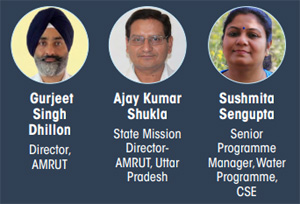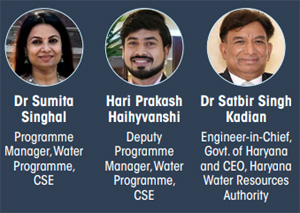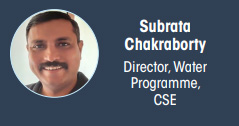Used-Water Treatment, Reuse and Rejuvenation Under AMRUT 2.0
The Atal Mission for Rejuvenation and Urban Transformation (AMRUT) 2.0, is a national initiative aimed at providing basic urban services and building sustainable infrastructure to improve the quality of life, particularly for the urban poor and disadvantaged communities. A key priority of AMRUT 2.0 is to make Indian cities water secure, with a focus on circular water economy and water body rejuvenation.
To further these objectives, Centre for Science and Environment (CSE), Delhi, organized a webinar on 11th April 2025 to discuss the work priorities under AMRUT 2.0, particularly in the areas of Lake Rejuvenation, Faecal Sludge and Septage Management (FSSM) and Treated Wastewater Reuse.
The webinar brought together sector experts, policymakers, and urban practitioners to discuss key achievements, challenges, and opportunities in these domains. The webinar aimed to promote sustainable urban water solutions in alignment with AMRUT 2.0’s mission of improving urban water infrastructure and environmental sustainability.
Aim of the webinar
To foster knowledge exchange and discussions on the policy interventions, best practices, and innovative solutions required to enhance sustainable urban water management under AMRUT 2.0. Experts shared insights on integrated water management approaches, ensuring cities move towards a circular water economy and a resilient urban future.
Mr Gurjeet Singh Dhillon, Director AMRUT, Ministry of Housing and Urban Affairs, delivered a keynote address during the webinar where he highlighted the success of AMRUT and the key priorities under AMRUT 2.0 for ensuring water security in India.
Key Discussion Areas
1. Lake Rejuvenation – Restoring Urban Water Bodies for a Climate-Resilient Future
Urban lakes and water bodies play a crucial role in groundwater recharge, flood control, and biodiversity conservation. Lake rejuvenation under AMRUT 2.0 is a key strategy to enhance urban resilience and create livable cities. The webinar will focus on the importance of urban lake conservation and rejuvenation, successful lake rejuvenation case studies from across the country and challenges and solutions in lake restoration and sustainable management.
Mrs Susmita Sengupta, Senior Programme Manager, CSE, delivered a session on " Rejuvenating urban sponges in the climate-risked world" in which she highlighted the ongoing lake conservation and rejuvenation practices prevalent in India.
2. Faecal Sludge and Septage Management (FSSM) – Strengthening Urban Sanitation
Many Indian cities lack centralized sewerage systems, making FSSM a crucial component of urban sanitation under AMRUT 2.0. Effective FSSM ensures the safe collection, treatment, and disposal of faecal sludge, preventing environmental pollution and public health risks. The webinar will cover key components of FSSM under AMRUT 2.0, treatment technologies and policy frameworks for effective implementation and implementation challenges and success stories demonstrating impact on health and environment.
Mr Hari Prakash Haihyvanshi, Deputy Programme Manager, CSE, delivered a session on "Strengthening Urban Sanitation: FSSM in Uttar Pradesh" in which he highlighted the journey of UP towards cleaner cities, different types of FSTPs and major steps taken to operationalize the plants by the State.
3. Treated Wastewater Reuse – Optimizing Water Resources for Sustainable Cities
One of AMRUT 2.0’s key focus areas is the reuse of treated wastewater to reduce freshwater dependency and mitigate environmental pollution. The mission aims to ensure that 20% of a city's water demand and 40% of industrial water demand are met through treated wastewater reuse at the state level.
The webinar will explore gaps in infrastructure for wastewater treatment and reuse, the potential of wastewater reuse in different sectors, regulatory and policy frameworks to promote reuse, economic and environmental benefits of wastewater recycling and strategies for public awareness generation and acceptance of treated wastewater reuse.
Dr Sumita Singhal, Programme Manager, CSE, delivered a session on "Treated Used-water Reuse – Optimizing Water Resources for Sustainable Cities" in which she highlighted the current reuse scenario in India and CSE's contribution to promote and streamline the reuse of treated usedwater and bolisoids.
Dr Satbir Singh Kadian, CEO, Haryana Water Resources Authority, delivered a session on "Treated Water Reuse in Haryana: Policies, Practices, and Potential," in which he highlighted the steps Haryana state hastaken to promote and adopt effective reuse of treated usedwater. Followed by an interactive Q&A session with the attendees of the webinar.
Target Audience
- National water and sanitation planning and executing agencies - Central/ State/ Municipal functionaries, State Urban Development Authorities, Jal Nigam, Water and Sewerage Boards etc.
- Urban Planners, Policy Makers, and Program and Project executives engaged in the implementation of urban water and wastewater solutions
- Universities and Academia, Researchers, NGOs working in the water and sanitation domain
- International NGOs, Bilateral and multi-lateral development agencies, Development Banks, Experts and Consultants.
WEBINAR COORDINATOR
UMRA ANEES
Programme Officer
Water Programme, CSE
Email: umra.anees@cseindia.org
Phone: +91 9773518511
| Agenda | |||
| Download pdf | |||
| Presentations | |||
| Rejuvenating urban sponges in the climate risked world By: Sushmita Sengupta |
|||
| Treated Used-water Reuse – Optimizing Water Resources for Sustainable Cities By: Dr Sumita Singhal |
|||
| Treated Water Reuse in Haryana: Policies, Practices & Potential By: Dr Satbir Singh Kadian |
|||
| Strengthening Urban Sanitation By: Hari Prakash Haihyvanshi |
|||
| Women & Youth Jal Hi Amrit For Water Security By: Gurjeet Singh Dhillon |
|||
| Used-Water Treatment, Reuse and Rejuvenation Under AMRUT 2.0 By: Subrata Chakraborty |
|||
| Report | |||
|
|||
| Flyer | |||
 |
|||
| Download flyer | |||
| Speaker | |||
 |
|||
 |
|||
| Moderator | |||
 |
|||


Share this article